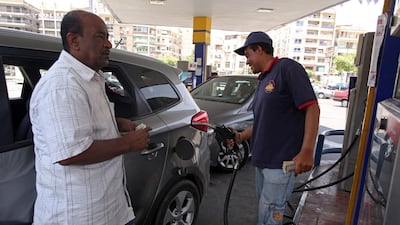Everyone focuses on how the poor will suffer following the Egyptian government's decision to boost fuel prices last week.
But let us spare a thought for some of the main victims of the price increases - Egypt's long-suffering wealthy.
Try to put yourself in their Guccis for a moment.
A few years ago, say, you bought an expensive new villa in the Fifth Settlement outside of Cairo and the government now keeps raising the price of petrol, electricity, diesel and natural gas on you. Now, even bigger bills are about to start coming in.
The government last week increased the price atthe pump of 92 octane petrol by 43 per cent to 5 Egypt pounds (Dh1.02) per litre. (Even the wealthier classes abandoned 95 octane, whose price had already been jacked up hugely long ago.) Driving that 4x4 back and forth to the mall just got that much more expensive.
The price of natural gas was raised. This may force you to stop heating the swimming pool in winter, or force you to buy expensive solar panels.
Even more price increases, those of electricity, are expected this week. Unconfirmed press reports say households consuming more than 1,000 kilowatt a month will have to pay prices that are actually above the cost of producing the power. That could mean quite a hefty bill when you're running five or more air conditioners at a time.
The poor no doubt will suffer tremendously. If even they do not consume much energy, an increase in the price can hurt if they are surviving off a few hundred pounds a month.
But it is the rich who consume the bulk of Egypt's energy, and many will have to make painful lifestyle adjustments.
A 2012 IMF study estimated that, internationally, the wealthiest 20 per cent of the population tends to consume more than 60 per cent of all petrol subsidies. The poorest 20 per cent get only 3 per cent. In Egypt, only one in 10 people even has access to a private car.
The move to reduce energy subsidies is long overdue. Because energy was so cheap, the average Egyptian was consuming increasing amounts at a time when the number of Egyptians was increasing by more than 2 per cent a year. In the years immediately after the uprising, consumption of petrol was increasing by an annual rate of 12 per cent, diesel at 6 per cent, fuel oil at 6 per cent and liquefied petroleum gas (LPG) at 10 per cent.
Subsidies long ago turned the country into a net energy importer, despite large oil and gas deposits.
Before international oil prices fell three years ago, energy subsidies accounted for 20 per cent of all state spending. Government after government, including those of president Hosny Mubarak, resisted the thought of increasing prices for fear of incurring the public's wrath.
The huge subsidy bill was a constant burden that held back growth and the problem got increasingly worse after the 2011 uprising, with the government having to hunt for funds to finance a budget deficit caused mainly by the subsidies.
The subsidies have also spawned corruption. In the past, favoured businesses got sweetheart deals, rather than pay international prices, for the natural gas they needed to run their factories. At times when the government did not have the money to supply enough petrol, quantities would disappear to be sold on the black market.
If you are looking to help the poor, subsidising energy is an extraordinarily inefficient way of doing so. The money spent on the subsidies would be far better spent on education, health and infrastructure the poor could benefit from. The government could also direct more funds to the poorest members of society through payments via smart cards and social funds, projects it has been working on.
Perhaps the higher cost of petrol will make the government rethink the disastrous new administrative capital it is building in the desert 50km outside of Cairo. The increased cost of getting there will now make it even less attractive than ever. Instead, any spare funds the government comes up with should be spent on building metro lines and fast rail in and around Cairo, as well as in other congested cities in Egypt. This is a project that would truly benefit the poor.
Even the increase in the price of cooking gas cylinders, which are used mainly by lower income people, may not be as damaging as it appears. The government has long subsidised them for sale at a fraction of what they cost to produce. But in reality it is hard to buy the cylinders at the subsidised price. Middlemen often shove their way into the distribution points, and with lots of bribes, to grab as much of the stock as possible to resell at a significant mark-up. Instead of paying the government for the cost of producing the cooking gas, consumers often pay the difference to corrupt middle men.
People argue that instead of making all these steep price increases at once, the government should have rolled them out gradually. But it is past that. No government goes to the IMF unless its finances are in complete disarray. The sooner the financial reforms are made, the less people - rich and poor - will suffer in the future.
Yes, 2017 is the year from hell for Egyptian consumers. But once the country's finances are straightened out the economy should soar.
Patrick Werr has worked as a financial writer in Egypt for 27 years.

